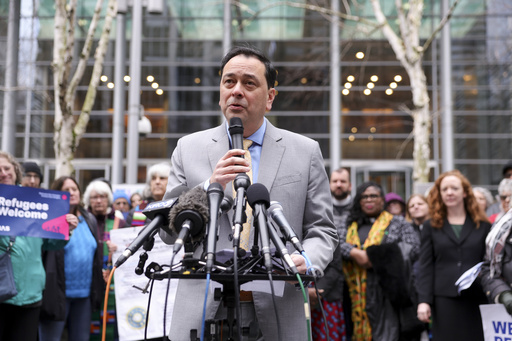A federal judge in Seattle has blocked an executive order by President Donald Trump that aimed to suspend the U.S. refugee admissions program. The judge ruled that while the president has significant authority over immigration, he cannot override a law passed by Congress that establishes the refugee program. The decision came in response to a lawsuit brought by individual refugees and major refugee aid organizations who argued that the suspension had forced them to lay off staff and stop processing applications.
Judge Jamal Whitehead, appointed in 2023 by former President Joe Biden, expressed that Trump’s actions effectively nullified the legislative intent behind the refugee admissions program. While he noted that the president does have considerable discretion to suspend admissions, this authority is not unlimited. The judge plans to release a more detailed written opinion in the coming days.
The Justice Department may appeal the ruling, as inferred from statements made by government lawyer August Flentje during the hearing. Trump’s order cited the challenges faced by communities from high migration levels and claimed insufficient capacity to accommodate large numbers of migrants and refugees. The administration indicated that hundreds of thousands of people worldwide are in the process of seeking refugee status in the U.S.
Although the refugee program has historically had bipartisan support, it has become a politically sensitive issue. Trump had made similar moves to halt and significantly reduce the number of refugees allowed into the U.S. during his first term. During the court proceedings, Flentje argued that the president’s decision falls within his authority to restrict entry to foreign nationals whose presence might negatively impact U.S. interests, describing it as a broad, law-like power.
Flentje questioned whether the lawsuit’s plaintiffs faced “irreparable” harm that justified the court’s intervention. He noted that many refugees affected by the travel suspension had relocated to safer countries and suggested the funding cutbacks amounted to contract disputes rather than critical harm.
Judge Whitehead, however, was unconvinced by the government’s argument, recognizing the severe impact on the refugees and the organizations that support them. He noted reports of refugees in perilous conditions, families separated by postponed travel plans, and resettlement agencies forced into layoffs.
The plaintiffs included several aid organizations and individual refugees and their families. They argued that Trump’s suspension hindered their ability to provide essential services and support to refugees, both abroad and domestically. Deepa Alagesan, representing the International Refugee Assistance Project, criticized the administration’s efforts to dismantle the program, arguing the president has not demonstrated any concrete detriment to the U.S. from allowing refugees.
Tshishiku Henry, an advocate for refugees in Washington state, recounted his experiences fleeing war and finding a new life in the U.S. He described the U.S. refugee program as more than just a shelter but a beacon of hope for a better future.
In a related legal matter, a judge in Washington, D.C., recently declined to temporarily halt the Trump administration’s refugee policies in a separate lawsuit filed by the United States Conference of Catholic Bishops. This case is set for another hearing soon.




